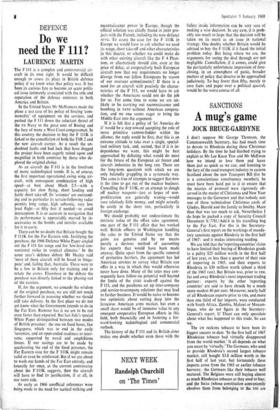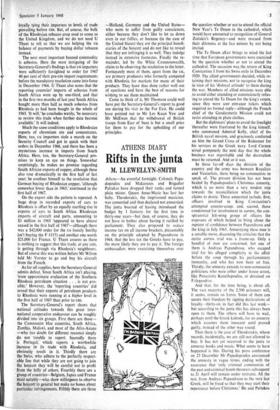A mug's game
SANCTIONS JOCK BRUCE-GARDYNE
I don't suppose Mr George Thomson, the Commonwealth Secretary, has had much time to devote to Rhodesia during these Christmas holidays. By the time he had finished trying to explain to Mr Lee Kuan Yew and Mr McEwen how we intend to love them and leave them just as quick as we can, and listening to the fury of the road transport industry in eastern Scotland about the new Transport Bill (for he is a conscientious constituency member), he must have been hard put to it to ensure that the niceties of protocol were rigorously ob- served in the matter of Christmas and New Year messages to the Governor and that nobody sent one of those technicolour Christmas cards of Gladys, Harold and the family to Smithy. More than that was too much to ask. Nevertheless I do hope he packed a copy of Security _Council Document S/ 7781 /Add.4 in his travelling bag to the Far East. For this is the Secretary- General's first report on the workings of manda- tory sanctions against Rhodesia in the first half of 1967: and it makes interesting reading.
We are told that the 'reporting countries' claim to have limited their buying of Rhodesian goods to a paltry $25 million worth in the first half of last year, or less than a quarter of their rate of importing in 1965; and their exports to Rhodesia to $30 million worth (about a third of the 1965 rate). But Britain was, prior to UM, far and away Rhodesia's most important trading partner: exports by the other 'reporting countries' are said to have shrunk by a much more modest 40 per cent. Moreover, nearly half of all Rhodesian exports prior to UDI, and,more than one third of her imports, were conducted with South Africa, Zambia, Malawi or Mozam- bique, who do not figure in the Secretary- General's report. U Thant can only speculate about what has happened to this trade. So can we.
The UN reckons tobacco to have been its biggest success to date. 'In the first half of 1967 Rhodesian tobacco had virtually disappeared from the world market.' It all depends on what you mean by 'virtually.' The Germans, who used to provide Rhodesia's second largest tobacco market, still bought $3.8. million worth in the first half of last year, but fortunately these imports arose from the 1965 or earlier tobacco harvests: the Germans like their tobacco well matured. The Belgians were still buying almost as much Rhodesian tobacco as they used to-buy; and the Swiss (whose constitution conveniently absolves them from belonging to the UN) are loyally tying their importers to levels of trade prevailing before UDI. But, of course, the bulk of the Rhodesian tobacco crop used to come to the United Kingdom, and we do not need U Thant to tell us that we are helping the us balance of payments by buying dollar tobacco instead.
The next most important banned commodity is asbestos. Here the most intriguing of- the Secretary-General's findings is that us importers were sufficiently farsighted to order for 1967 40 per cent of their pre-uut import requirements before the mandatory resolution came into force in December 1966. U Thant also notes that the reporting countries' imports of asbestos from South Africa were up by one-third, and that in the first two months of last year South Africa bought more than half as much asbestos from Rhodesia as had been bought in the whole of 1965. 'It will,' he concludes warily, 'be necessary to review this trade when further data become available.' It will indeed.
Much the same conditions apply to Rhodesian exports of chromium ore and concentrates. Here, too, us importers stole a march on the Security Council and got in quick with their orders in December 1966, and there has been a mysterious increase in imports from South Africa. Here, too, the Secretary-General pro- mises to keep an eye on things. Somewhat surprisingly, he makes no promise regarding South African exports of copper, although these also rose dramatically in the first half of last year; he confines himself to the revelation that German buying of Rhodesian copper, 'although somewhat lower than in 1965,' continued in the first half of 1967.
On the export side the pattern is repeated. A huge drop in recorded exports of cars to Rhodesia is offset by an equally startling rise in exports of cars to South Africa. Rhodesian imports of aircraft and parts, amounting to $3 million in 1965 'appeared to have almost ceased in the first half of 1967'—although there was a $42,000 order for the us (surely Smithy isn't buying the F 111?) and another one worth $21,000 for France. U Thant assures us there is nothing to suggest that this trade, at any rate, is getting through via Rhodesia's neighbours. But of course this was written before Mr Wilson told Mr Vorster to go and buy his aircraft from the French.
As for oil supplies, here the Secretary-General admits defeat. Since South Africa isn't playing, 'even approximate evaluation of the Southern Rhodesia petroleum situation . . . is not pos- sible.' However, the 'reporting countries' did
reveal that their exports of petroleum products to Rhodesia were running at a higher level in the first half of 1967 than prior to UDI.
The Secretary-General's report shows that national attitudes towards this great inter- national cooperative endeavour can be roughly
divided into six groups. First there are those— the Communist bloc countries-, South Africa,
Zambja, Malawi, and most of the Afro-Asians —who (no doubt for different reasons) simply do not trouble to report. Secondly there is Portugal,' which reports a worthwhile increase in its trade with Rhodesia, and obviously revels in it. Thirdly there are the Swiss, who adhere to the perfectly respect- able line that while they are not going to join the boycott they will be careful not to profit from the folly of others. Fourthly there are a group of countries—Belgium, Japan and France most notably—who show willingness to observe the boycott in general but make no bones about particular infringements. Fifthly there are those
—Holland, Germany and the United States— who seem to suffer from guilty consciences, either because they don't like to let us down even in our follies, or because (in the case of the United States) they are the principal benefi- ciaries of the boycott and do not like to reveal that they are infringing it as well. They indulge instead in extensive footnotes. Finally the re- mainder, led by the White Commonwealth, claim to be observing the resolution to the letter. Fortunately most of them, apart from the UK, are primary producers who formerly competed with Rhodesia for markets for many of their products. They have thus done rather well out of sanctions and have the best of reasons for Wishing to see them maintained.
Come to think of it, Mr Thomson could well have put the Secretary-General's report to good use during his visit to the Far East. He could have pointed out to Mr Lee Kuan Yew and Mr McEwen that the withdrawal of British troops from East of Suez is but a small price for them to pay for the upholding of our principles.



































 Previous page
Previous page